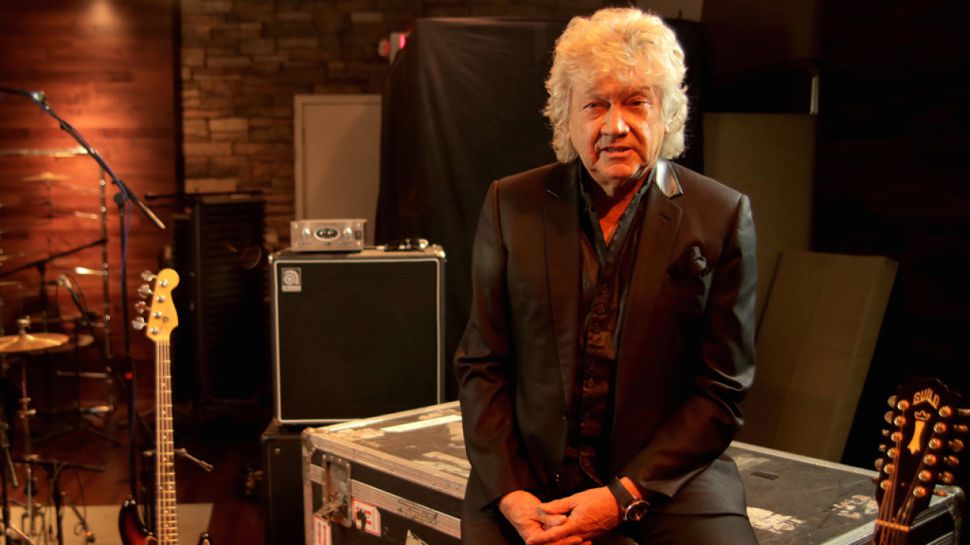“There’s nobody to mentor us these days. People at the label encouraged us to write and record – those people have gone”: When John Lodge accepted there’d be no more Moody Blues music
Bassist, vocalist, songwriter and proud Brummie on tempering his solo plans because the band came first, why a memoir wasn’t on his list, and knowing very well that a light year is a measure of distance

The Moody Blues’ final album, December, was released in 2003. Fans were still hoping for new music in 2019 when bassist, vocalist and songwriter John Lodge was preparing a solo tour. He told Prog about the challenges of balancing the two projects.
The Moody Blues effectively invented symphonic rock in the late 60s, and constantly evolved their sound over the next couple of decades. In addition, John Lodge has shown himself to be a shrewd and creative musician as an occasional solo artist.
His most recent album 10,000 Light Years Ago came out in 2015, and now he's about to go out on his own tour around Britain. A Rock And Roll Hall Of Fame inductee, Lodge is showing little sign of slowing down.
As there's been no new Moody Blues music since 2003, is it fair to say your solo career is now the focus for writing?
I believe that's fair. And I’m enjoying the whole process of writing songs for solo records, because it means I can do it differently to the way I've done in the past for The Moody Blues. I can go from A to Z to W in a composition before ending at B – I have the chance to experiment, which I love. I’m already working on songs for the next solo album.
You've only done two solo albums. Do you regret not doing more?
I do. But it's always been a case of a lack of time. After I did Natural Avenue in 1977, I had no chance to even think of about doing else on my own – I was almost straight back in the studio doing Octave with the Moodies, and then we were back out on the road. I’m first and foremost a Moody Blue; so with all the recording and touring commitments we had for so long, there was never a chance to do another solo album.
Sign up below to get the latest from Prog, plus exclusive special offers, direct to your inbox!
Where do the Moodies stand these days?
The problem we have on the recording side is that there’s nobody to mentor us these days. We always had people at the label who encouraged us to write and record; and those sort of people have gone out of our lives.
I love the whole process of making a Moody Blues album. But without anyone to push us, I cannot see there being any new songs released. I hope we can still tour, but it’s now a little problem to get Justin Hayward and Graeme Edge to agree.
You’re joining the Birmingham Walk Of Stars at Birmingham Symphony Hall, along with Carl Palmer. What does that mean to you?
I’m proud to be from Birmingham. It’s obviously amazing to get such an honour from your hometown. I’m very excited for my family and friends to be there and see it. I’ll have a lot of old mates who'll be turning up and they'll be able to say, “Look, that's little Johnny Lodge, who used to get us into clubs for free!”
Was it an important moment when The Moodies were inducted into the Rock And Roll Hall Of Fame?
When I realised how many people voted for us, it was incredibly humbling. That really had an impact on me. Standing on the stage looking out at the thousands in the venue, I was thinking about here I was, shoulder to shoulder with my own heroes and already in the Hall Of Fame, like Buddy Holly. That's a fantastic feeling.
I have some great stories to tell – but I’d rather tell mates at a party
But I’ll admit that when I was initially told we'd been nominated, it didn't really mean that much to me. Knowing so many fans wanted us in was pivotal.
You called your last solo album 10,000 Light Years Ago. Are you aware a light year is a measure of distance, not time?
I know! But if you think about it, the light we see these days from the stars is actually thousands of years old. So there’s an element of time about it. If you could travel those massive distances to the source of the light, the chances are you’d find nothing.
But what we’re seeing in the sky represents a bygone period of time. I accept the scientific definition of a light year – but to me it's the time element that matters most.

Are there any plans to write your memoirs?
I have no interest in taking on something like that. For me, the past has gone and I’m looking forward to the future. I have no wish to tell stories for a book. Besides, how accurate can it be? Unless you kept a diary covering all those years, then you’re relying on your memory, which can play tricks on you.
If you get five people to tell the way they recall a certain incident, you’ll end up with five versions. So what I would write in a book would be more my interpretation of what occurred rather than the absolute truth. Yes, I have some great stories to tell from the Moody Blues’ past – but I’d rather tell mates at a party and not any put into print.
Malcolm Dome had an illustrious and celebrated career which stretched back to working for Record Mirror magazine in the late 70s and Metal Fury in the early 80s before joining Kerrang! at its launch in 1981. His first book, Encyclopedia Metallica, published in 1981, may have been the inspiration for the name of a certain band formed that same year. Dome is also credited with inventing the term "thrash metal" while writing about the Anthrax song Metal Thrashing Mad in 1984. With the launch of Classic Rock magazine in 1998 he became involved with that title, sister magazine Metal Hammer, and was a contributor to Prog magazine since its inception in 2009. He died in 2021.
You must confirm your public display name before commenting
Please logout and then login again, you will then be prompted to enter your display name.


